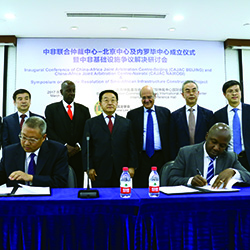
E: info@scia.com.cn
W: www.scia.com.cn
The SCIA’s new rules make it the first arbitration institution in China to hear investor-state arbitrations and administer cases under Uncitral Arbitration Rules.
Advanced Arbitration Rules
The new SCIA rules were unveiled on October 26, 2016 and took effect on December 1, 2016, including the SCIA Arbitration Rules, the Special Rules of Maritime and Logistics Arbitration and the SCIA Guidelines for the Administration of Arbitration under the UNCITRAL Arbitration Rules. By enforcing the new rules, SCIA is the first arbitration institution in Mainland China to hear investor-state arbitrations and administer cases under the Unictral Arbitration Rules.
Highlights of the new rules:
- Party Autonomy
— Presiding Arbitrator
The SCIA Arbitration Rules allow the parties to nominate a presiding arbitrator from candidates recommended by the president of
the SCIA.
— Applicable Laws
The parties may choose applicable laws.
— Arbitration Rules
The parties may agree on the application of other arbitration rules, including the Uncitral Arbitration Rules.
— Conduct of Hearing Proceedings
The parties may agree to adopt inquisitorial, adversarial or other approaches in the oral hearings.
— Language and Place of Arbitration.
The parties’ agreement on the language and place of arbitration prevails. - Investment Arbitration
The SCIA is the first arbitration institution in Mainland China to hear investor-state arbitrations and administer cases under the Uncitral Arbitration Rules. - UNCITRAL Arbitration Rules
The SCIA Guidelines for the Administration of Arbitration under the Uncitral Arbitration Rules is a milestone in terms of introducing Uncitral Arbitration Rules into Mainland China. - Hong Kong as the Place of Arbitration
For cases where the parties choose to apply the Uncitral Arbitration Rules, if they have agreed on the place of arbitration, the parties’ agreement shall prevail; if they have not agreed on the place of arbitration, unless otherwise determined by the arbitral tribunal, the place of arbitration shall be Hong Kong.
Multiple Services: Arbitration + Mediation + Negotiation Facilitation
Besides arbitration service, the SCIA also provides mediation and negotiation facilitation services. Where a settlement agreement is reached through mediation or negotiation facilitation, the parties may apply to the arbitral tribunal for rendering an arbitral award or a mediation statement in accordance with the terms of the settlement agreement.
The SCIA established several centres to provide multiple services:
- Free Trade Zone Financial Arbitration Centre
- High Technology and Intellectual Property Arbitration Centre
- Qianhai Maritime and Logistics Arbitration Centre
- Shenzhen Securities and Futures Dispute Resolution Centre
- Guangdong, Hong Kong & Macau Mediation Alliance
- Negotiation Facilitation Centre
Online Arbitration
The SCIA supplies the parties with a safe and user-friendly online arbitration system. With the decision by the arbitral tribunal or the consent of the parties, the arbitration proceedings may be conducted via online oral hearing system.
SCIA Chronology
- 1983: The SCIA was established as the first arbitration institution in the Guangdong-HK-Macau region since the Opening and Reform.
- 1989: The SCIA became the first arbitration institution in Mainland China whose arbitral award was recognised and enforced outside Mainland China pursuant to the New York Convention.
- 2007: The model of “Chamber of Commerce Mediation + Arbitration” and the model of “Exhibition Mediation + Arbitration” were created. The SCIA was designated by the Ministry of Commerce as the only arbitration and mediation institution to resolve international trade disputes for China Import and Export Fair (the Canton Fair).
- 2009: The dispute resolution model of “Hong Kong Mediation + Shenzhen Arbitration” was created. The SCIA started to provide online arbitration and mediation services.
- 2011: The Centre for Arbitration and Mediation of the Chamber of Commerce Guangdong, the Centre for Arbitration and Mediation of the Chamber of Commerce Shenzhen, and the South China In-house Counsel Forum were established.
- 2012: The SCIA became the first statutory body among China’s arbitration institutions.
- 2015: The SCIA handled China’s largest arbitration cases ever of which the amount in dispute was Rmb13.4 billion. The case was settled within 13 days.
- 2016: The SCIA implemented new rules, including the SCIA Arbitration Rules, the Special Rules of Maritime and Logistics Arbitration and the SCIA Guidelines for the Administration of Arbitration under the UNCITRAL Arbitration Rules.
- 2017: The China-Africa Joint Arbitration Centre (Shenzhen) was established in the SCIA.
Model Dispute Resolution Clauses
- For all disputes:
Model Arbitration Clause 1:
Any dispute arising from or in connection with this contract shall be submitted to SCIA for arbitration.
Model Arbitration Clause 2:
Any dispute arising from or in connection with this contract shall be submitted to SCIA for arbitration. - For international, foreign-related disputes or disputes related to the Hong Kong Special Administrative Region, the Macau Special Administrative Region and Taiwan Region:
Model Arbitration Clause 3:
Any dispute, controversy or claim arising out of or relating to this contract, including but not limited to the interpretation, performance, breach, termination or invalidity, shall be submitted to the Shenzhen Court of International Arbitration in accordance with the Uncitral Arbitration Rules (2013).
Model Arbitration Clause 4:
Any dispute, controversy or claim arising out of or relating to this contract, including but not limited to the interpretation, performance, breach, termination or invalidity, shall be settled by arbitration in accordance with the Uncitral Arbitration Rules (2013), and the appointing authority shall be the Shenzhen Court of International Arbitration.
About SCIA
The Shenzhen Court of International Arbitration (SCIA, also known as the South China International Economic and Trade Arbitration Commission) was established in 1983 in the Shenzhen Special Economic Zone. It is an arbitration institution founded to resolve contract disputes, investment disputes and other property rights disputes among individuals, legal entities and other institutions from China and overseas.
Corporate Governance Structure
The SCIA was the first arbitration institution established by legislation authorising its corporate governance structure with an international council, which ensures openness, transparency and independence.
International Panel of Arbitrators and Arbitration Cases
The SCIA has included foreign professionals on its panel of arbitrators since 1984, the first arbitration institution in Mainland China to do so. The current panel comprises 870 arbitrators from 50 countries, resolving disputes for the arbitration parties from more than 60 countries and mediation parties from 112 countries.

Contact Information
Address:
Headquarter: 41/F, the West Square of the Shenzhen Stock Exchange Building, 2012 Shennan Blvd., Futian District, Shenzhen, P.R.China
Futian Office: 19/F, Blk B, Zhongyin Building, 5015 Caitian Road, Futian District, Shenzhen, P.R.China
Qianhai Shekou FTZ Office: A110, Blk A, Qianhai Complex, Yueliangwan Avenue, Nanshan District, Shenzhen, P.R.China
Luohu Office: 2/F, 5045 Shennan East Road, Luohu District, Shenzhen, P.R.China
Telephone: 86-755-83501700
For more Dispute Resolution Special Report in this issue
 Asia gears up for international arbitration
Asia gears up for international arbitration
Developments across the region are supporting the development of alternate dispute resolution mechanisms that will promote further investment into Asia’s …
 Q&A – Katherine Yap, chief executive of Maxwell Chambers
Q&A – Katherine Yap, chief executive of Maxwell Chambers
Singapore’s Maxwell Chambers is an integrated dispute resolution complex housing best-in-class hearing facilities and support services, as well as top international alternate dispute resolution (ADR) institutions. …

Asian-mena Counsel speaks to Tom Glasgow, investment manager for Asia at IMF Bentham, about the environment for third-party funding in the region…
 The role of arbitration in promoting Sino-African trade and investment
The role of arbitration in promoting Sino-African trade and investmentIn March, the Beijing Arbitration Commission/Beijing International Arbitration Centre (BAC) and the Nairobi Centre for International Arbitration (NCIA) formally founded the China-Africa Joint Arbitration Centre…















